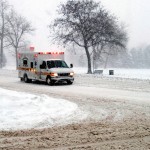Prepare for Cold Weather
 Monday, January 11, 2010 at 04:04PM
Monday, January 11, 2010 at 04:04PM  Heavy snowfall and extreme cold can immobilize an entire region. Even areas that normally experience mild winters can be hit with a major snowstorm or extreme cold. Winter storms can result in flooding, storm surge, closed highways, blocked roads, downed power lines and hypothermia.
Heavy snowfall and extreme cold can immobilize an entire region. Even areas that normally experience mild winters can be hit with a major snowstorm or extreme cold. Winter storms can result in flooding, storm surge, closed highways, blocked roads, downed power lines and hypothermia.
How can you prepare your home and family?
Prepare for possible isolation in your home by having sufficient heating fuel; regular fuel sources may be cut off. For example, store a good supply of dry, seasoned wood for your fireplace or wood-burning stove.
Winterize your home to extend the life of your fuel supply by insulating walls and attics, caulking and weather-stripping doors and windows, and installing storm windows or covering windows with plastic.
Winterize your house, barn, shed or any other structure that may provide shelter for your family, neighbors, livestock or equipment. Clear rain gutters; repair roof leaks and cut away tree branches that could fall on a house or other structure during a storm.
Insulate pipes with insulation or newspapers and plastic and allow faucets to drip a little during cold weather to avoid freezing.
Keep fire extinguishers on hand, and make sure everyone in your house knows how to use them. House fires pose an additional risk, as more people turn to alternate heating sources without taking the necessary safety precautions.
Learn how to shut off water valves (in case a pipe bursts).
Know ahead of time what you should do to help elderly or disabled friends, neighbors or employees.
Hire a contractor to check the structural ability of the roof to sustain unusually heavy weight from the accumulation of snow - or water, if drains on flat roofs do not work.
How can you prepare your car?
Check or have a mechanic check the following items on your car:
Antifreeze levels - ensure they are sufficient to avoid freezing.
Battery and ignition system - should be in top condition and battery terminals should be clean.
Brakes - check for wear and fluid levels.
Exhaust system - check for leaks and crimped pipes and repair or replace as necessary. Carbon monoxide is deadly and usually gives no warning.
Fuel and air filters - replace and keep water out of the system by using additives and maintaining a full tank of gas.
Heater and defroster - ensure they work properly.
Lights and flashing hazard lights - check for serviceability.
Oil - check for level and weight. Heavier oils congeal more at low temperatures and do not lubricate as well.
Thermostat - ensure it works properly.
Windshield wiper equipment - repair any problems and maintain proper washer fluid level.
Install good winter tires. Make sure the tires have adequate tread. All-weather radials are usually adequate for most winter conditions. However, some jurisdictions require that to drive on their roads, vehicles must be equipped with chains or snow tires with studs.
Maintain at least a half tank of gas during the winter season.
Place a winter emergency kit in each car that includes:
shovel, windshield scraper and small broom, flashlight, battery powered radio, extra batteries, water, snack food, matches, extra hats, socks and mittens, first aid kit with pocket knife, necessary medications, blanket, tow chain or rope, road salt and sand, booster cables, emergency flares , and a fluorescent distress flag.
How should you dress for the weather?
Wear several layers of loose fitting, lightweight, warm clothing rather than one layer of heavy clothing. The outer garments should be tightly woven and water repellent.
Wear mittens, which are warmer than gloves.
Wear a hat.
Cover your mouth with a scarf to protect your lungs.
SOURCE: www.fema.gov
 Champion,
Champion,  Champion Construction Systems,
Champion Construction Systems,  Community News,
Community News,  Current Events,
Current Events,  Emergency Planning,
Emergency Planning,  Flood Damage,
Flood Damage,  Freeze,
Freeze,  Georgia,
Georgia,  Restoration,
Restoration,  Water Damage,
Water Damage,  burst pipes,
burst pipes,  champion construction,
champion construction,  cold,
cold,  cold weather,
cold weather,  customer service,
customer service,  disaster planning,
disaster planning,  disaster preparedness,
disaster preparedness,  freezing temperatures,
freezing temperatures,  frozen pipes,
frozen pipes,  ice,
ice,  newnan ga,
newnan ga,  north atlanta,
north atlanta,  pipe freeze,
pipe freeze,  quick response,
quick response,  sharpsburg,
sharpsburg,  snow,
snow,  winter pipes,
winter pipes,  winter preparedness,
winter preparedness,  winter storm,
winter storm,  winter weather,
winter weather,  wintertime
wintertime  Email Article
Email Article 

Reader Comments